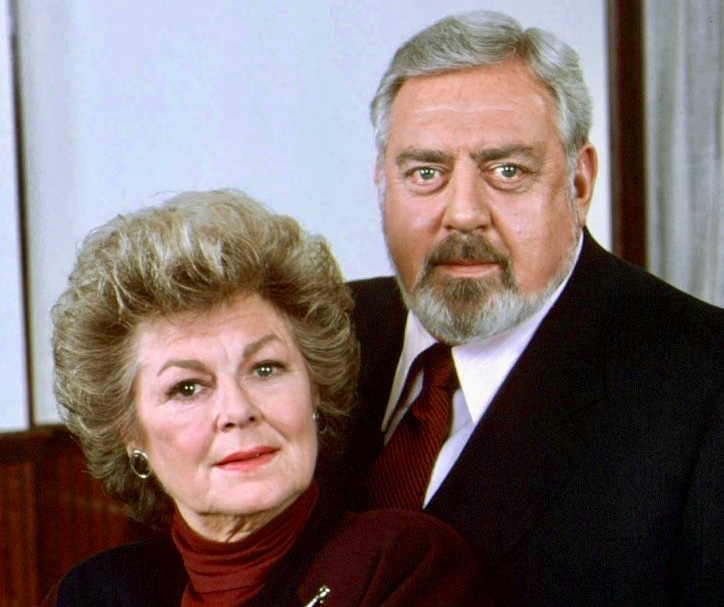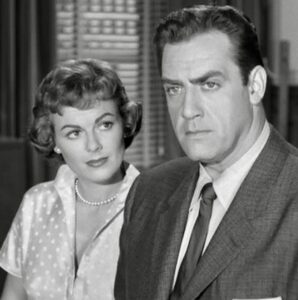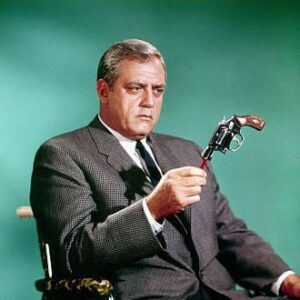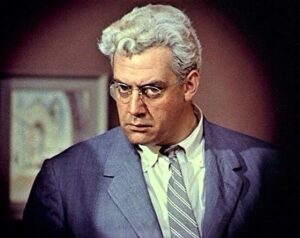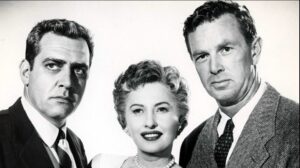By Ray Bennett
LONDON – Nostalgia was very much in the air in 1986 when I met Raymond Burr, who was born 105 years ago today. He was in the thick of it. His two long-running series from the Fifties and Sixties – ‘Perry Mason’ and ‘Ironside’ – ran in syndication. ‘Perry Mason Returns’ had been the highest rated TV-movie of the previous year and a sequel did just as well.
After he died aged 78 in 1993, stories emerged of how Burr had fabricated many details of his private life largely to shield the fact that he was gay. When I spent a couple of hours with him in the piano bar of the Mondrian Hotel in Los Angeles, that was not an issue. It was true that he was a world traveler, a gardener, a gourmet and a philanthropist. He was a wine expert, an authority on forestry, a grower of orchids and principal owner of a newspaper. Also, he was one of the most recognisable actors in the world.
We met to talk about another NBC TV-movie he’d made as Perry Mason, ‘The Case of the Shooting Star’ (with Barbara Hale, pictured top). It had been filmed in Canada as the producers liked the cost benefits of the Canadian dollar. There was a much deeper connection for Burr. He was born in New Westminster, British Columbia and although he moved to the United States when he was 6, the time and place of his birth had a profound impact on the man he would become.
‘I was born during the famine right after World War I,’ he said. ‘Canada was really hit very hard because they had sent everything they had to England. It devastated the country. All the rose bushes were dug up and people planted potatoes. You lived on potatoes, macaroni and rice. Starch, all starch. When I was born, I was called a “potato baby”. I weighed twelve and half pounds and weight has been a problem all my life.’
He was aware that his size bothered some people. ‘It completely destroys people when I get too heavy but my blood pressure is the same as when I was 20,’ he said. ‘I can still get up a hill faster than most. I am beginning to take it off, though. I’ve lost about thirty pountds but it takes a lot before it shows on me. It has never been a consideration. Whatever I weighed, that was whatever I weighed.’
The stifling legacy of Victorian British Columbia also left its mark. ‘My father William, who worked as a hardware salesman, was a very provincial Canadian,’ Burr said. ‘He didn’t agree with anything in the United States at all. He was a good person but he had his rules on the way he wanted to live his life. He did not deviate one day to the next. He had to have his meals exactly at a certain time of the day. He wouldn’t get on a plane or a boat. My father hated trips while my mother loved them. She loved flying, boats or anything. She used to drive very well and she’d take the three of us children on long trips.’
His parents separated when Burr was six and divorced three years later. ’With a broken family, I was sort of a father to my brother and sister,’ he said. ‘My mother was a very great lady with a lot of guts. We moved to northern Californa but she always sent me back to see my father every year. They always were in love with each other. It was a great tragedy. All the women in my family had great strength – my grandmothers and great-grandmothers – some good strength and some not-so-good strength. Some overpowered their families. My father’s mother lived to be 102. Six months after she died, my mother and father remarried and spent the last ten years of their lives together in California. You could never have gotten my father to do that while his mother was alive but he was able to break through enough, you know?’
Raising three children alone in the 1920s was not easy but Minerva Smith Burr was no ordinary woman. She taught music and opened music shops that became very successfil. ‘She made a lot of money,’ Burr told me, ‘but then the Depression hit and nobody was buting pianos or records or sheet music. She lost one shop after another so she went back to school to get another degree so that she could get better teaching jobs.’
Burr said he spent summers working on a sheep and cattle ranch in New Mexico in order to bring home some money. They lived in a small cottage in an unfinished sub-division in the hills near Berkeley. The closer neighbours were a block away, an Italian family with three generations living together. ‘They made bread, cheese and wine,’ he said. ‘I grew a garden and we traded vegetables, rabbits and chicken for good Italian wine and homemade Italian cheese. When we could splurge, we splurged, but we learned how to cook.’
Later, they moved to an attic apartment in Berkeley, a three-storey walkup: ‘We had no furniture but my mother had a concert grand piano. She didn’t care about possessions. The one time I ever saw her fretful of anything was when they found the only way they could the piano up was from outside through the window. It went up on a pulley and when she saw her piano dangling on a rope over the street, it was the only time I ever saw her almost break down and cry. They got it in and we made furniture our of boxes.’
Minerva Smith Burr became a celebrated concert pianist. She played a huge Wurlizer pipe organ with the San Francisco Symphony every Christmas. The little attic apartment was the scene of many parties with visiting composers, musicians and opera stars.
Burr said he dreamed of a musical career for himself’: ‘I wanted to study with my mother because she was the best teacher but I never pushed her because I’d hear her working until eight o’clock at night teaching somebody and I thought, hell, let her have her time off.’
Instead, in the late 1930s, Burr joined the Civilian Conservation Corps, which was set up for unemployed young men to work in forests around America. He graduated into the forestry service and learned about water and soil conservation, planting trees and fighting fires. There was a payoff later when he became a United Nations adviser to the island nation of Fiji in the South Pacific.
‘They wanted to plant pine trees and so we planted pine from the Caribbean on all the hills on the dry side of the island,’ Burr said. ‘They have great forests there but I was the one who fought for fire roads because they hadn’t put in any fire roads. They said they were a tropical island with plenty of rain. I pointed out that fire would destroy the forest if they didn’t have fire roads. They didn’t build any until the hills burned and then they said, “Get Burr down here.”’
Burr spent a lot of time in Fiji. He had a thriving orchid business there and he owned a large part of the Fiji Sun newspaper. ‘Everyone asked why would I leave a civilised place like California and go to a place like Fiji,’ Burr told me. ‘I said I was going to a much more civilised place. And it’s true, I wasn’t going from something, I was going to something. I’ve said many times that there are beautiful beaches and palm trees all over the world but it depends upon who inhabits that part of the world as to whether or not it’s a desirable place to go to. Fiji is one of them and Portugal is another. Two great, great countries … because of the people.’
Burr had property in the Portuguese Azores and a farm in Dry Creek Valley, Sonoma County, in northern California where he lived when he was not working. All that came following the success of the original ‘Perry Mason’ when he was aged 40. After breaking into theatre in New York and finding success on radio, he became a busy film actor usually playing villains in movies such as ‘A Cry in the Night’, ‘Rear Window’ and ‘Crime of Passion’. When ‘Perry Mason’ came along in 1957, Burr immersed himself in it. In those days, each series had thirty-nine episodes every season and as the title character, Burr was in almost every scene. He lived at the studio, he said, ‘Fortunately, I was not married and I wasn’t a parent. I would have been the worst parent in the world and I would have been unmarried very shortly.’
Still, after nine years as the world’s best defence attorney, he stepped into another title role as the paraplegic detective in ‘Ironside’, which ran from 1967 to 1975. This time, however, he also was a co-producer and he made sure his co-stars, Don Galloway and Barbara Anderson, saw plenty of action. He never spent a night in the studio. He did have to change some things.
‘When I saw the first script, I thought it was a dreadful idea,’ he said. It was sort of a cross between Batman and something. Ironside had a van with a complete forensic laboratory where you could solve any crime. He had a wheelchair with weapons in the arms. It took a while to get it around to being a good human story.’
In the years since ‘Ironside’ he had one short-lived series (‘Kingston’ in 1977), made seven movies and TV specials and toured England on the stage. ‘I did not stop working at any time,’ he said. He turned down the notion of revisiting Perry Mason for many years because it was always suggested as another one-hour series. ‘I had no interest in doing another weekly show,’ he told me, ‘but I said I would do the show anytime if it were feature length. When Fred Silverman and Dean Hargrove came up with the plan of an occasional series of TV movies, I said that as long as they got Barbara Hale (pictured) then I would do the show.’ Hale had played Mason’s secretary Della Street in the old series. They went on to make a total of 27 Mason TV-movies.
Burr was pleased that, unlike the original series, the Perry Mason TV-movies allowed time for some humour. ‘Earle Stanley Gardner and his wife both had great senses of humour but our producers did not so you saw very little humour from Mason at all,’ he said. ‘This time, you will see more humour with each succeeding show.’ Burr’s great sorrowful eyes crinkled merrily. ‘People forget that my first Broadway Show was a musical. I sang and danced and said funny things. Shakespeare isn’t always Macbeth. Shakespeare is the Fool too.’

